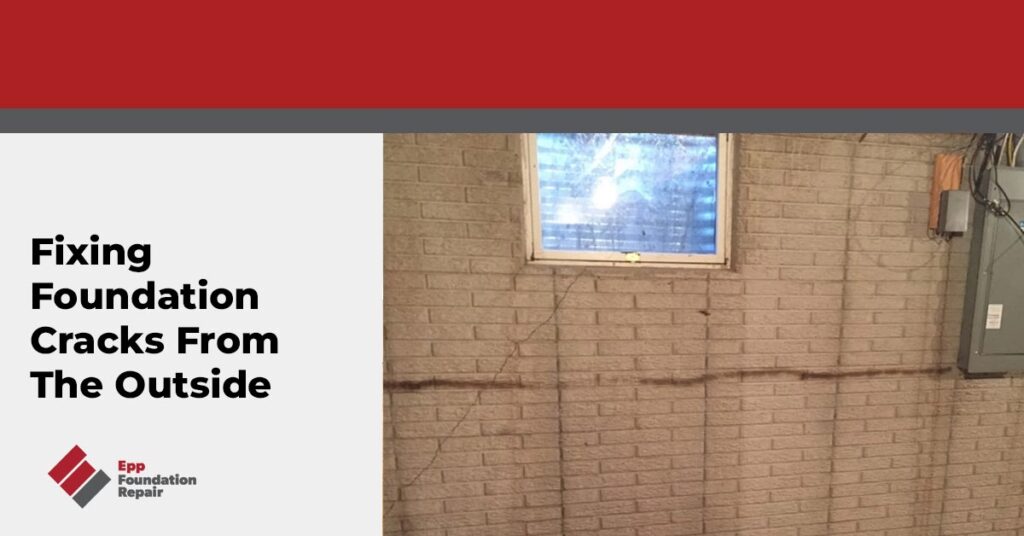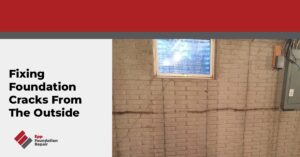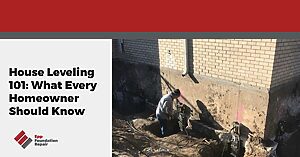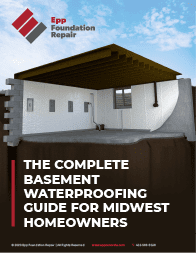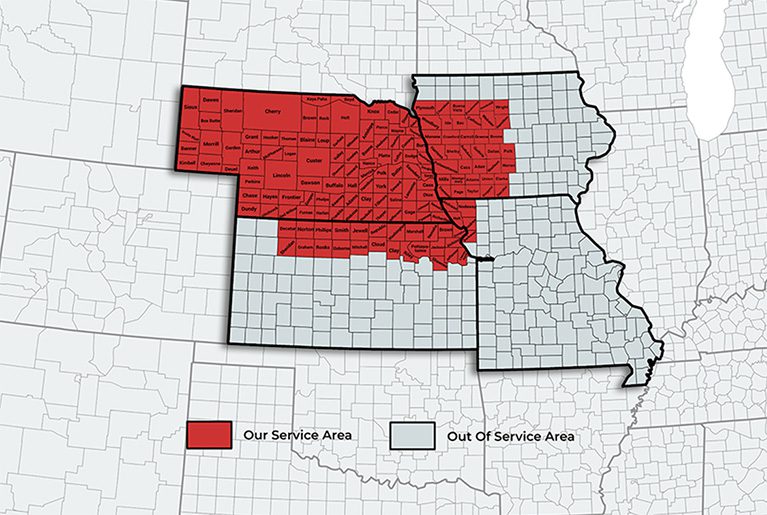Looking for information about fixing foundation cracks from the outside? If so, you’ve landed on the right page because that’s what we’re going to talk about in this article. We’re going to talk about what causes foundation cracks, fixing foundation cracks from the outside, how to prevent foundation cracks and more.
Don’t Panic. Foundation Cracks Are Common
If you’re a homeowner, cracks in your home’s foundation might cause you to lose sleep. Don’t panic – foundation cracks are common and can almost always be quickly fixed by a foundation repair professional.
What are Foundation Cracks & Why Do They Need Fixing
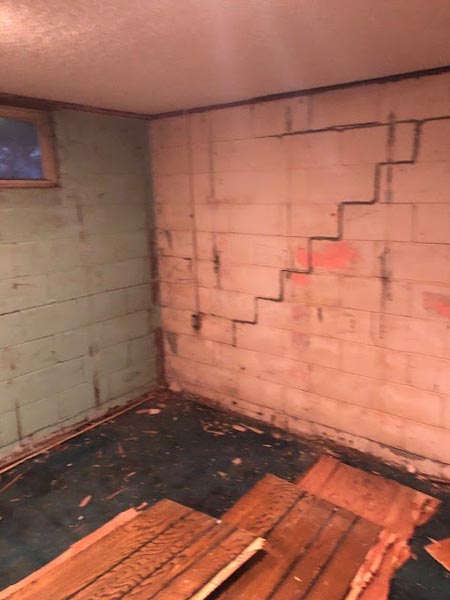
Foundation cracks are cracks in a building’s foundation. They’re caused by various factors and can range from obvious cracks to minor, barely noticeable hairline fractures.
Foundation cracks need to be fixed because, left unaddressed, the problem that caused the foundation crack will worsen and could eventually threaten your home’s structural integrity.
If you’ve noticed a crack and suspect your home might have a foundation problem, contact an experienced foundation repair contractor right away. They’ll be able to assess the situation and make any necessary repairs before matters worsen.
What Causes Foundation Cracks?
Several causes could lead to cracks appearing in the foundation. However, before discussing what causes foundation cracks, we need to briefly go over the two types of foundation cracks: structural and non-structural.
Structural foundation cracks are serious cracks that affect the home’s structural integrity. Non-structural cracks are just unsightly. They don’t affect the structural integrity of the house.
Structural foundation cracks
Structural foundation cracks are most often caused by differential settlement. This is when a foundation settles into the ground unevenly.
So, what causes differential settlement? Differential settlement is usually caused by one of the following:
- Expansive soil – Expansive soil, because it contains a lot of clay, swells when it soaks up moisture and then shrinks as it dries out. This creates movement in the ground under the foundation and can eventually lead to differential settlement.
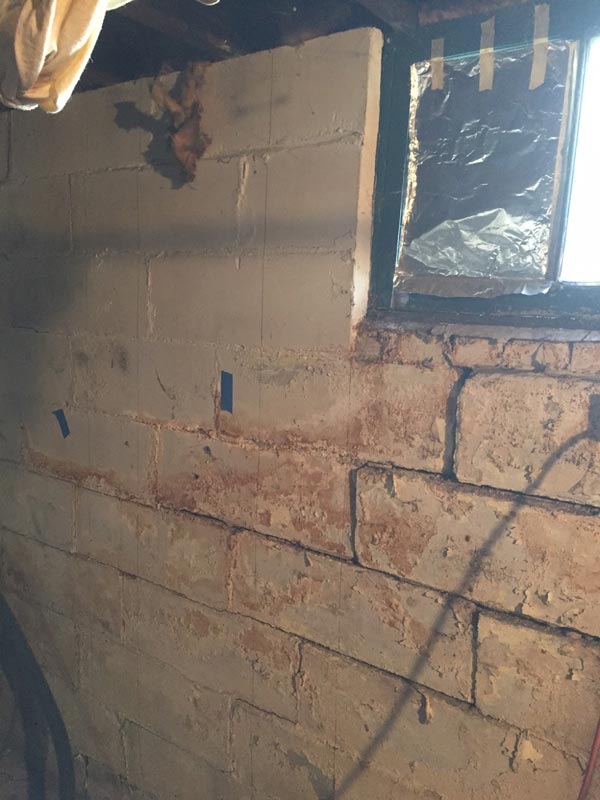
- Soil not compacted before construction – Soil needs to be tamped down before construction. If this isn’t done correctly, the structure could settle into the ground unevenly after it’s built.
- Natural disasters – It goes without saying that natural disasters like earthquakes, floods, tornadoes, etc., can cause foundation problems.
- Excavation next to the foundation – If your neighbor next door decides to dig a big hole too close to your house, it could destabilize the foundation and cause differential settlement.
- Erosion-prone soil – Some types of soil are prone to erosion, and erosion can lead to the formation of voids under the foundation. If the foundation sinks into the voids, there will be problems.
- Weather changes – An example of this would be building a new house on top of expansive soil during the dry season. When the rainy season rolls around again, the soil swells and pushes against the foundation. This could cause differential settlement.
- Weak soil – Some soil types aren’t strong enough to adequately support a foundation.
Non-structural foundation cracks
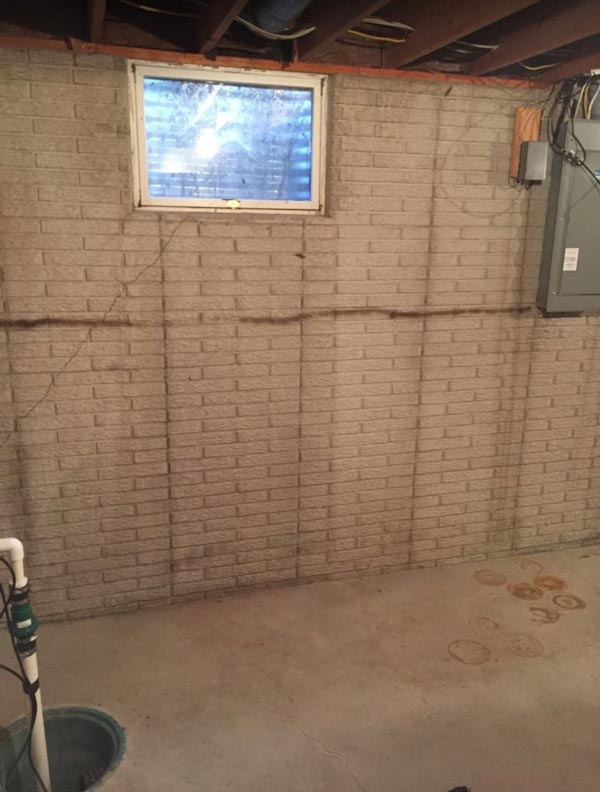
A common cause of non-structural foundation cracks in a poured concrete foundation wall is shrinkage during the concrete curing process. Hairline cracks form, and while they’re not structurally significant, they can allow water to seep through the wall and into your basement or crawl space. Therefore, they should be sealed.
If you notice any of these hairline cracks getting bigger, contact a professional foundation repair contractor immediately because the crack might be structural.
For more information, see Structural or Non-Structural? Understanding Foundation Cracks.
Fixing Foundation Cracks From The Outside
Sometimes, it’s impossible to fix a foundation crack from inside the home, or the homeowner doesn’t want to remove drywall to access the crack. In these cases, the foundation crack can be fixed from the outside. The general procedure is as follows:
- The soil around the crack is excavated down to the footing.
- After the crack is cleaned, hydraulic cement and waterproofing tar are applied.
- A vapor barrier is applied over the waterproofing tar.
- Finally, the excavated soil is replaced.
Fixing foundation cracks from the outside is more work than repairing the crack from the inside, which could mean a more expensive repair.
DIY Foundation Crack Repair
While it may seem tempting to try tackling this issue alone, fixing foundation cracks from outside of the house is not a DIY project. Attempting repairs without the proper knowledge could cause more harm than good and result in damage that could have been prevented had the repair been performed by an experienced contractor.
Signs of Foundation Problems
Every homeowner should know the most common signs of foundation problems. These include the following:
- Wall, floor, or ceiling cracks
- Uneven floors
- Gaps around window and door frames
- Windows and doors that don’t open and close properly
- Ceilings and floors that are separating from the wall
- Walls that have bowed inward
- Torn or wrinkled wallpaper
- Diagonal cracks from the corners of doors and windows
- Stair step cracks in brick or masonry
- Chimneys and porches that are pulling away from the house
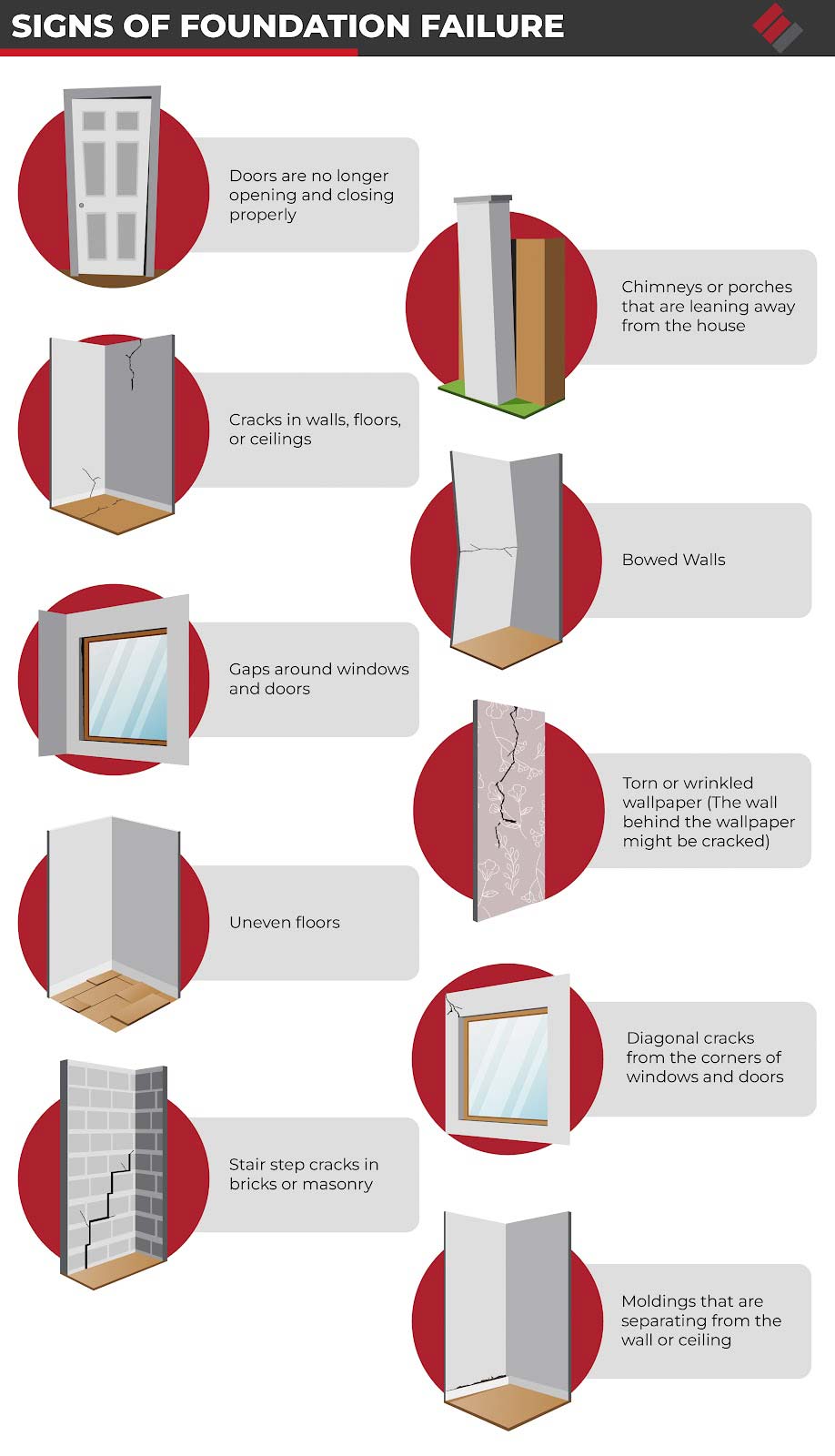
If you see any of the above or anything else that looks suspicious, contact a professional foundation repair contractor and ask for an evaluation. A qualified contractor will be able to identify the root cause of any problem so that the appropriate repair solution can be determined and implemented. Whatever you do, don’t delay. Ignoring minor problems with your foundation can result in more significant issues down the road that may cost substantially more to fix if you wait.
How To Prevent Foundation Cracks
You can prevent foundation cracks by making sure the soil around your home has proper drainage and isn’t too dry or wet. Here are some ways to do that:
- Maintain your gutters, so they don’t get clogged with debris and cause water to spill over the side of the house and soak the ground around the foundation.
- Consider relocating any water-hungry vegetation planted next to the house. You don’t want a reason to add moisture to the soil.
- Install downspout extensions, so water gets channeled away from the foundation before being released.
- If necessary, regrade your yard, so it slopes away from the foundation. This will prevent water from draining toward the foundation.
- Install a drain tile system. This is the best foundation waterproofing solution available today. For more information on how a drain tile system works, see The Importance Of Proper Foundation Drainage Around Your Home.
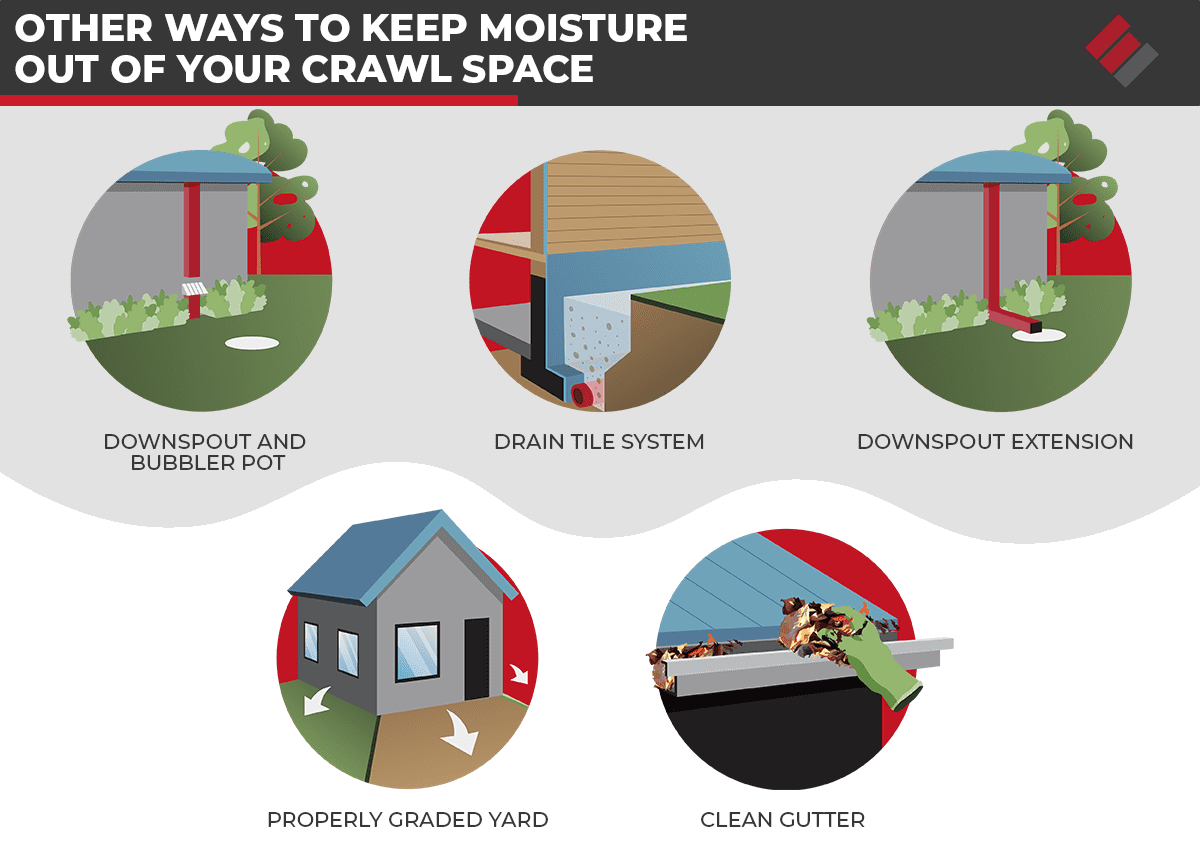
When to Call a Professional Contractor
Regardless of size and location, foundation cracks should always be addressed promptly. If you’ve noticed cracks in your foundation, the best solution is to contact a professional foundation repair contractor. A professional contractor can assess and repair the damage without risking further damage or rendering your home unsafe.
It’s also important to note that repairing foundation cracks from outside your home requires special equipment that isn’t available to most homeowners, so attempting repairs on your own could result in costly mistakes.
Questions to Ask Potential Repair Companies
It is essential to do some research to ensure that you are hiring a reputable foundation repair contractor. Before committing to services, homeowners should ask contractors about their experience in the industry, any warranties they offer on their work, as well as what materials and methods they use for repairs. Don’t be afraid to ask any questions during the consultation–chances are that the company you’re considering hiring will be more than happy to provide detailed answers.
If your home has a foundation crack that needs to be looked at, contact us today to schedule an evaluation and receive a repair estimate. Since 1994, we’ve helped clients in Lincoln, Omaha, Southeastern Nebraska, Northwestern Missouri, and parts of Northeastern Kansas with foundation repair, basement waterproofing, crawl space encapsulation and concrete leveling for their homes.

